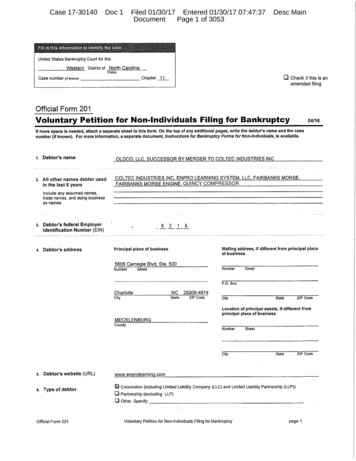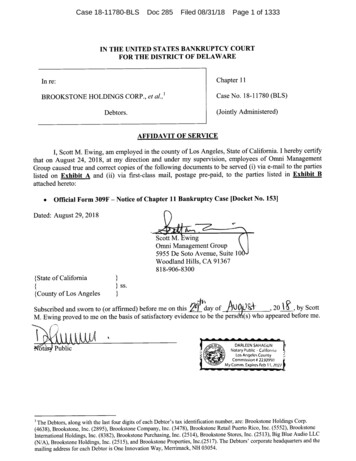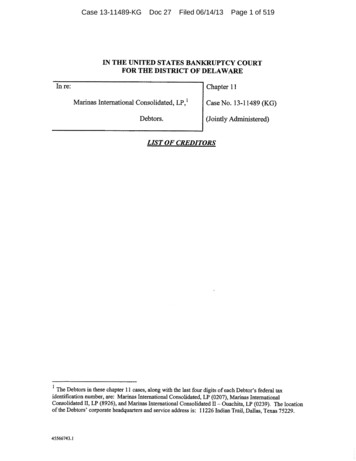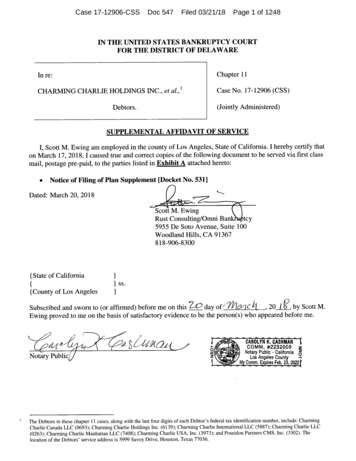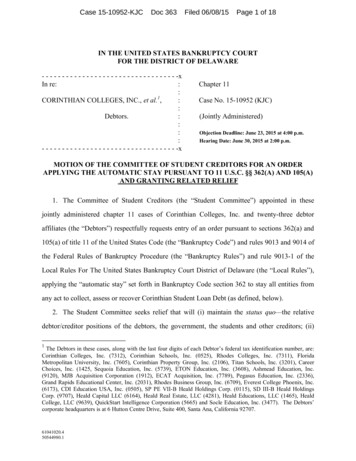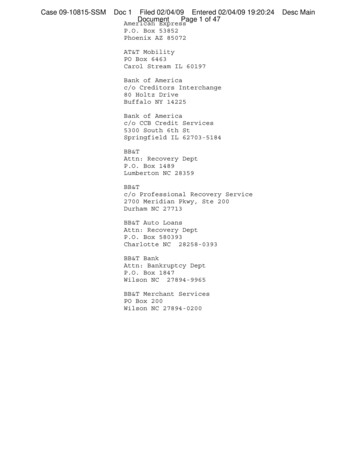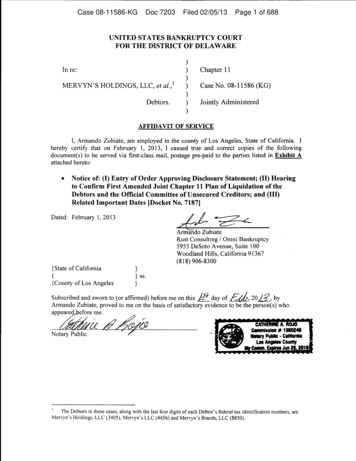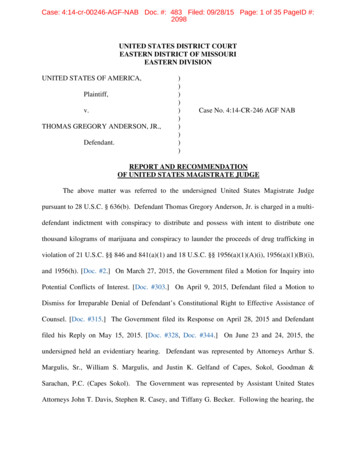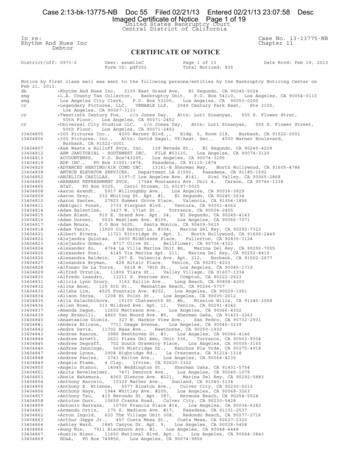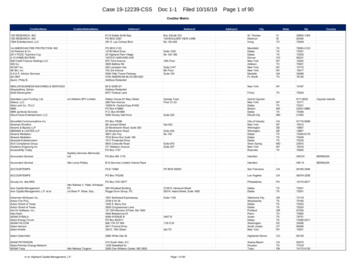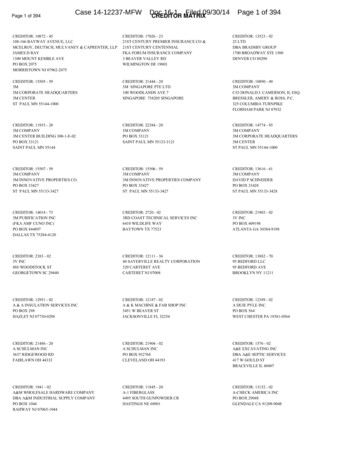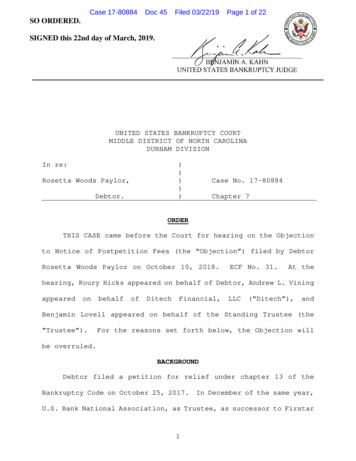
Transcription
Case 17-80884Doc 45Filed 03/22/19Page 1 of 22SO ORDERED.SIGNED this 22nd day of March, 2019.UNITED STATES BANKRUPTCY COURTMIDDLE DISTRICT OF NORTH CAROLINADURHAM DIVISIONIn re:)))))Rosetta Woods Paylor,Debtor.Case No. 17-80884Chapter 7ORDERTHIS CASE came before the Court for hearing on the Objectionto Notice of Postpetition Fees (the “Objection”) filed by DebtorRosetta Woods Paylor on October 10, 2018.ECF No. 31.At thehearing, Koury Hicks appeared on behalf of Debtor, Andrew L. ech”),andBenjamin Lovell appeared on behalf of the Standing Trustee (the“Trustee”).For the reasons set forth below, the Objection willbe overruled.BACKGROUNDDebtor filed a petition for relief under chapter 13 of theBankruptcy Code on October 25, 2017.In December of the same year,U.S. Bank National Association, as Trustee, as successor to Firstar1
Case 17-80884TrustCompanyasDoc 45Trustee,Filed 03/22/19forPage 2 of 22ManufacturedHousingContractSenior/Subordinate Pass-Through Certificate Trust 1996-3 (“U.S.Bank”), filed a proof of claim on Official Form 410 in the amountof 43,857.51.Claim No. 2-1.The claim provides that noticesshould be sent to U.S. Bank care of Ditech.The debt reflected inthe claim arises from a mortgage loan secured by a deed of therprovisions, the deed of trust requires the borrower to maintainhazard insurance as follows:Borrower shall keep the improvements now existing orhereafter erected on the Property insured against lossby fire, hazards included within the term “extendedcoverage” and any other hazards, including floods orflooding, for which Lender requires insurance.Theinsurance shall be maintained in the amounts and for theperiods that Lender requires.The insurance carrierproviding the insurance shall be chosen by Borrowersubject to Lender’s approval which shall not beunreasonably withheld.If Borrower fails to maintaincoverage described above, Lender may, at Lender’soption, obtain coverage to protect Lender’s rights inthe Property. . . .Id. at 19, ¶ 5.Attached to the claim is a Limited Power ofAttorney (the “U.S. Bank Power of Attorney”) executed on behalf ofU.S. Bank appointing Ditech as servicer and attorney in fact forbroad purposes with respect to the underlying loan documents,including demanding, suing, collecting, or recovering any amountduetoU.S.Bankinanybankruptcy(particularly at 27, ¶ 1).2action.Id.at25-29
Case 17-80884Doc 45Filed 03/22/19Page 3 of 22On July 30, 2018, Ditech filed a Notice of PostpetitionMortgage Fees, Expenses, and Charges (the “Postpetition Notice”),alleging 1,0072/3/18-2/3/19.” 1owedfor“LenderPlacedInsuranceEffectiveThe Postpetition Notice specifically refers toClaim No. 2 but lists Ditech as the creditor.Debtor objected to the Postpetition Notice, alleging Ditech’sfailure to comply with N.C. Gen. Stat. § 45-91(1).According toDebtor, Ditech waived its right to payment for the insurance under§ ithout: (1) timely assessing the insurance; and (2) producing acopy of the clear and conspicuous explanatory statement about theinsurance mailed to Debtor at her last known address. 2Debtor alsoobjected to Ditech’s filing of the Postpetition Notice, arguingthat the holder of the claim did not file the notice as requiredby Federal Rule of Bankruptcy Procedure 3002.1.Ditech timely responded to the Objection.ECF No. 31. 3Ditech asserts that insurance is not a “fee” as contemplated by1Two days later, on August 1, the Trustee filed a motion to begin monthlydisbursements to Ditech pursuant to the Postpetition Notice. ECF No. 27Objections to the Trustee’s motion were due on or before September 4, 2018.No party filed an objection and, on September 6, the Court entered an orderauthorizing the Trustee to begin making disbursements on the lender placedinsurance expense. ECF No. 29.2Ditech’s Postpetition Notice provides that the fees, costs, and expenses wereincurred on February 3, 2018, which was 177 days before Ditech’s PostpetitionNotice was filed with the Court, and therefore more than the forty-five daysrequired by § 45-91.3The Court set the Objection for hearing on November 20, and subsequentlycontinued the hearing to December 20. ECF Nos. 38, 40.3
Case 17-80884§ 45-91(1).Doc 45Filed 03/22/19Page 4 of 22According to Ditech, § 45-91(1) does not apply toexpenses typically collected by a lender or servicer for ncludesinsurance as an escrow item, the insurance expense is not a “fee”as contemplated by the statute.Thus, Ditech argued that the timelimits and notice requirements of § 45-91(1) are inapplicable.Ditech also asserted compliance with Rule 3002.1 in that U.S. Banklisted its claim as “care of” Ditech.Following the arguments ofcounsel, the Court took the matter under expenseinsuranceconstitutes a “fee” under North Carolina General Statute § 4591(1); and (2) whether the Postpetition Notice was defectivebecause it was filed and served by Ditech and listed Ditech as thecreditor on the official form.A.An expense incurred by a servicer for a force placed insurancepremium is not a fee as contemplated by N.C. Gen. Stat. § 4591(1).Chapter 45 of the North Carolina General Statutes governsmortgages and deeds of trust, including mortgage debt collectionand servicing under Article 10. Pursuant to Article 10, a servicerof a home loan must comply with the time limits and noticerequirements of § 45-91(1), which provides as follows:Any fee that is incurred by a servicer shall be both:4
Case 17-80884Doc 45Filed 03/22/19Page 5 of 22a. Assessed within 45 days of the date on which thefee was incurred. Provided, however, that attorneyor trustee fees and costs incurred as a result of aforeclosure action shall be assessed within 45 daysof the date they are charged by either the attorneyor trustee to the servicer.b. Explained clearly and conspicuously in a statementmailed to the borrower at the borrower’s last knownaddress within 30 days after assessing the fee,provided the servicer shall not be required to takeany action in violation of the provisions of thefederal bankruptcy code. The servicer shall not berequired to send such a statement for a fee thateither:1. Is otherwise included in a periodic statementsent to the borrower that meets the requirements ofparagraphs (b), (c), and (d) of 12 C.F.R.§ 1026.41.2. Results from a service that is affirmativelyrequested by the borrower, is paid for by theborrower at the time the service is provided, andis not charged to the borrower’s loan account.N.C. Gen. Stat. § 45-91(1) (2018). 4If a servicer fails to complywith these requirements, the fee is waived.§ 45-91(3). 5Neither Article 10 nor the remainder of Chapter 45 containsa definition for the term “fee,” see §§ 45-21.1, 45-36.4, 45-67,4The reference to periodic statements in subdivision (b).1. addresses thetiming, form, and content of periodic statements for residential mortgage loansunder the Truth in Lending Act. 12 C.F.R. § 1026.41(b)-(d) (2019).5“The filing of a proof of claim with the court does not satisfy therequirements of N.C. Gen. Stat. § 45-91(1).” In re Hillmon, 2011 Bankr. LEXIS5536, *3.5
Case 17-8088445-81,45-90,6andDoc 4545-101,Filed 03/22/197andthePage 6 of 22meaningof“fee”ascontemplated by § 45-91(1) has not been addressed by the NorthCarolina courts.Because state law controls and there is no statelaw addressing the issue, the Court “must . . . offer its bestjudgment about how [North Carolina’s] highest court would rule [onthe issue], giving appropriate weight to any opinions of [NorthCarolina’s] intermediate appellate courts.”Anderson v. Sara LeeCorp., 508 F.3d 181, 190 (4th Cir. 2007) (citing Food Lion, Inc.v. Capital Cities/ABC, Inc., 194 F.3d 505, 512 (4th Cir. 1999)).The Court must therefore anticipate how the North Carolina SupremeCourt would interpret the term “fee” as contemplated by § 45-91.The North Carolina Supreme Court adheres to the followingprinciples of statutory construction:In matters of statutory construction, our primary taskis to ensure that the purpose of the legislature, thelegislative intent, is accomplished. Hunt v. Reinsurance6 Section 45-90(2) defines “servicer” by incorporating the definition used inthe Real Estate Settlement Procedures Act, 12 U.S.C. § 2605(i), which defines“servicer” as “the person responsible for servicing of a loan (including theperson who makes or holds a loan if such person also services the loan).” 12U.S.C. § 2605(i)(2) (2018); see also In re Saeed, No. 10-10303, 2010 WL 3745641,at *2 (Bankr. M.D.N.C. Sept. 17, 2010). Further a “home loan” is:A loan secured by real property located in this State used, orintended to be used, by an individual borrower or individualborrowers in this State as a dwelling, regardless of whether theloan is used to purchase the property or refinance the priorpurchase of the property or whether the proceeds of the loan areused for personal, family, or business purposes.§ 45-90(1). There is no dispute in this case that the loan is a home loan orthat Ditech is a servicer as contemplated by the statute.7The definitions contained in §§ 45-21.1, 45-36.4, 45-67, 45-81, and 45-101apply only within each of the applicable Articles of Chapter 45. Nevertheless,none of these sections defines the term “fee.”6
Case 17-80884Doc 45Filed 03/22/19Page 7 of 22Facility, 302 N.C. 274, 288, 275 S.E.2d 399, 405 (1981).Legislative purpose is first ascertained from the plainwords of the statute. See Burgess v. Your House ofRaleigh, 326 N.C. 205, 209, 388 S.E.2d 134, 136 (1990).Moreover, we are guided by the structure of the statuteand certain canons of statutory construction. See, e.g.,Media, Inc. v. McDowell County, 304 N.C. 427, 430-31,284 S.E.2d 457, 461 (1981) (“statutes dealing with thesame subject matter must be construed in pari materia”);Builders, Inc. v. City of Winston-Salem, 302 N.C. 550,556, 276 S.E.2d 443, 447 (1981) (“It is presumed thatthe legislature intended each portion to be given fulleffect and did not intend any provision to be meresurplusage”).Elec. Supply Co. of Durham v. Swain Elec. Co., 328 N.C. 651, 656,403 S.E.2d 291, 294 (1991).A court may examine the legislativehistory of a statute only when, after analyzing the plain termsand structure, the court still is in doubt as to the legislativeintent.Id. at 656, 403 S.E.2d at 295.A statute’s plain words are accorded their “natural e.”Turlington v. McLeod, 323 N.C. 591, 594, 374 S.E.2d 394, 397(1988).That is, “[n]othing else appearing, the [North Carolina]Legislature is presumed to have used the words of a statute toconvey their natural and ordinary meaning.”Perkins v. Ark.Trucking Servs., Inc., 351 N.C. 634, 638, 528 S.E.2d 902, 904(2000) (quoting In re McLean Trucking Co., 281 N.C. 242, 252, 188S.E.2d 452, 458 (1972)).When “determining the plain meaning ofundefined terms,” the Supreme Court of North Carolina relies on“‘standard, nonlegal dictionaries’ as a guide.”7Midrex Techs.,
Case 17-80884Doc 45Filed 03/22/19Page 8 of 22Inc. v. N.C. Dep’t of Revenue, 369 N.C. 250, 258, 794 S.E.2d 785,792 (2016) (quoting Elec. Supply Co., 328 N.C. at 656, 403 (AngusStevenson & Christine A. Lindberg eds., 3d ed. 2010) (“New g”in§ 105-130.4(a)(4)); see also Turlington v. McLeod, 323 N.C. 591, )andNewTheAmerican Heritage Dictionary of the English Language 1345 (1969)for a definition of “timber” that, in ordinary usage, gave effectto the statute’s intent); Black v. Littlejohn, 312 N.C. 626, 638,325S.E.2d469,478(1985)definition of “injury”).(citingWebster’s(1971))foraFor terms commonly used in a legal andnonlegal context, the North Carolina Supreme Court also has reliedon Black’s Law Dictionary.See, e.g., Walker v. Bd. of Trs. ofthe N.C. Local, Governmental Emps.’ Ret. Sys., 348 N.C. 63, 66,499 S.E.2d 429, 431 (1998) (citing Black’s Law Dictionary 1471(6th ed. 1990) for a definition of “terminate” as used in chapter128 of the North Carolina General Statues because “this word isunambiguous”); Nelson v. Battle Forest Friends Meeting, 335 N.C.133, 136, 436 S.E.2d 122, 124 (1993) (relying on Deluxe Black’sLaw Dictionary 41 (6th ed. 1990), in addition to The Random HouseDictionary of the English Language 25 (2d ed. 1987) (“RandomHouse”), Chambers English Dictionary 16 (1988), and The Oxford8
Case 17-80884Doc 45Filed 03/22/19Page 9 of 22English Dictionary 156 (2d ed. 1989), for definitions of the term“adjoin” as used in § 1-44.2).Finally, the court should “look at various related statutesin pari materia so as to determine and effectuate the legislativeintent.”Craig v. Cty. of Chatham, 356 N.C. 40, 46, 565 S.E.2d172, 176 (2002); cf. In re R.L.C., 361 N.C. 287, 294, 643 S.E.2d920, 924 (2007) (“When determining the meaning of a statute, thepurpose of viewing the statute in pari materia with other statutesis to harmonize statutes of like subject matter and, if at allpossible, give effect to each.”)(1)The natural and ordinary meaning of “fee” as used in§ 45-91(1) does not include an insurance premium.By its plain terms, N.C. Gen. Stat. § 45-91(1) applies onlyto “any fee 8 incurred by a servicer 9 . . . .”Guided by standarddictionaries on which the North Carolina Supreme Court previouslyhas relied, the natural and ordinary meaning of “fee” in Chapter45 does not contemplate payments for insurance premiums.8Section 45-91 refers to “fee” or “fees” in two other instances in subdivisions(3) and (4) of the statute. Subdivision (3) provides that the failure to chargethe “fee” or provide notice as required in subdivision (1) constitutes a waiverof “such fee,” and subdivision (4) requires that “[a]ll fees charged . . . mustbe otherwise permitted under applicable law and the contracts between theparties.”In each instance, the statute solely refers to fees without anyreference to other costs, charges, or expenses.9Article 10 does not purport to apply to fees charged under the loan documentsby the holder, only fees incurred by a servicer. Fees chargeable by the lenderunder the loan documents are governed and limited by other statutes. See, e.g.,§§ 24-1.1A(c), (g) 24-8(d); 24-10; 24-10.1(b)(6) (2017) (requiring lender togive a borrower notice of the imposition of late fees within 45 days followingthe date the payment was due).9
Case 17-80884Doc 45Filed 03/22/19Page 10 of 22The term “fee” is frequently used in both legal and nonlegalcontexts.The dictionaries previously cited by the North CarolinaSupreme Court include a number of definitions of “fee” inapplicableto Chapter 45.For example, “fee” is variously defined as anestate of inheritance in land, see Random House, supra, at 706(2001); see also New Oxford, supra, at 634 (same); Webster’s,supra, at 833 (same) (2002), personal property, an mission.Webster’s, supra, at 833 (2002). None of these definitions comportwith the meaning of fees that may be incurred by a servicer orwith the nature of insurance premiums as discussed below.The definitions the Court will consider in more detail includethe following:Fee. A charge fixed by law for services of publicofficers or for use of a privilege under control ofgovernment . . . . A recompense for an official orprofessional service or a charge or emolument orcompensation for a particular act or service. A fixedcharge or perquisite charged as recompense for labor;reward, compensation, or wage given to a person forperformance of services or something done or to be done.Deluxe Black’s Law Dictionary 614 (6th ed. 1990).fee . . . 3b : a charge fixed by law or by an institution(as a university) for certain privileges or services alicense fee a toll-road fee a college-admission fee research fees laboratory fees tuition fees . 4b :compensation often in the form of a fixed charge forprofessional service or special and requested exerciseof talent or of skill . . . a doctor’s a lawyer’sretainer .Webster’s, supra, at 833.10
Case 17-80884Doc 45Filed 03/22/19Page 11 of 22fee . . . 1 a payment made to a professional person orto a professional or public body in exchange for adviceor services. . . . (usu. fees) money regularly paid (esp.to a school or similar institution) for continuingservices: high tuition fees required by the schools.New Oxford, supra, at 634.fee . . . 1. A charge or payment for professionalservices: a doctor’s fee. 2. A sum paid or charged fora privilege: an admission fee.Random House, supra, at 705–06 (2001).fee . . . 4(b) a reward for professional services: as,a lawyer’s fee; a clergyman’s marriage fee.III The Century Dictionary and Encyclopedia 2168 (1911).fee . . . the price paid for services, such as to alawyer or physician.C.M. Schwarz, The Chambers Dictionary (13th ed. 2015).These definitions fall into two general aw,orpersonalservices, such as a filing fee, registration fees, license fee, orother fixed charge.Second, a fee is defined as a charge forprofessional services, such as an attorney’s fee or a trustee’sfee.Insurance and insurance premiums fall into neither of thesetwo categories because, for the reasons that follow, insurancepremiums are not a fixed charge for a personal service, nor doesinsurance constitute a professional service as contemplated byChapter 45.11
Case 17-80884a.Doc 45Filed 03/22/19Page 12 of 22An insurance premium is not a fixed charge for apersonal service.Generally, insurance is not considered a personal service forwhichpremiumsarecharged. 10InNorthCarolina,insurancecontracts are governed by state law, § 58-3-1, 11 and are defined asan agreement by which the insurer is bound to pay moneyor its equivalent or to do some act of value to theinsured upon, and as an indemnity or reimbursement forthe destruction, loss, or injury of something in whichthe other party has an interest.§ 58-1-10.An insurer’s contractual obligation to pay money under ahazard nce is not work or labor, 12 nor is it related to otherpersonal services.Cf. Mitchell, Brewer, Richardson, Adams, Burge& Boughman v. Brewer, No. 06 CVS 6091, 2013 WL 765372, at *6 (N.C.Super. Feb. 26, 2013), aff’d, 803 S.E.2d 433 (N.C. Ct. App. 2017)(describing “personal services” as “personal skill and effort”);Henry Angelo & Sons, Inc. v. Prop. Dev. Corp., 63 N.C. App. 569,574, 306 S.E.2d 162, 166 (1983) (quoting Black’s Law Dictionary10Insurance premiums constitute “the consideration paid for undertaking toindemnify the insured against a specified peril.”Steven Plitt, DanielMaldonado, Joshua D. Rogers, & Jordan R. Plitt, 5 Couch on Insurance § 69:1 (3ded. 2018) (“Couch on Insurance”); see also 5-24 Appleman on Insurance Law &Practice Archive § 24.2 (premium is the consideration paid “by the insured inbargain for the insurer’s assumption of the risk transferred from the insured”).11In North Carolina, a contract for insurance is unlawful “unless and exceptas authorized under” Chapter 58. § 58-3-5.12The North Carolina General Assembly also has defined personal services inthe context of warranties under Chapter 58 as “work, labor, and otherpersonal services.” § 58-1-15.12
Case 17-80884Doc 45Filed 03/22/19Page 13 of 22943 (rev. 4th ed. 1968) (“Insurance is ‘a contract whereby, for astipulated consideration, one party undertakes to compensate theother for loss on a specified subject by specified perils.’”));Fairbanks v. Superior Court, 46 Cal. 4th 56, 61, 205 P.3d 201, 203(2009) (concluding that insurance is not a service for purposes ofCalifornia’s Consumer Legal Remedies Act,
Ditech timely responded to the Objection. ECF No. 31. 3. Ditech asserts that insurance is not a “fee” as contemplated by . 1. Two days later, on August 1, the Trustee filed a motion to begin monthly disbursements to Ditech pursuant to the Postpetition Notice. ECF No. 27 Objections to the Trustee’s motion were due on or before September 4 .

